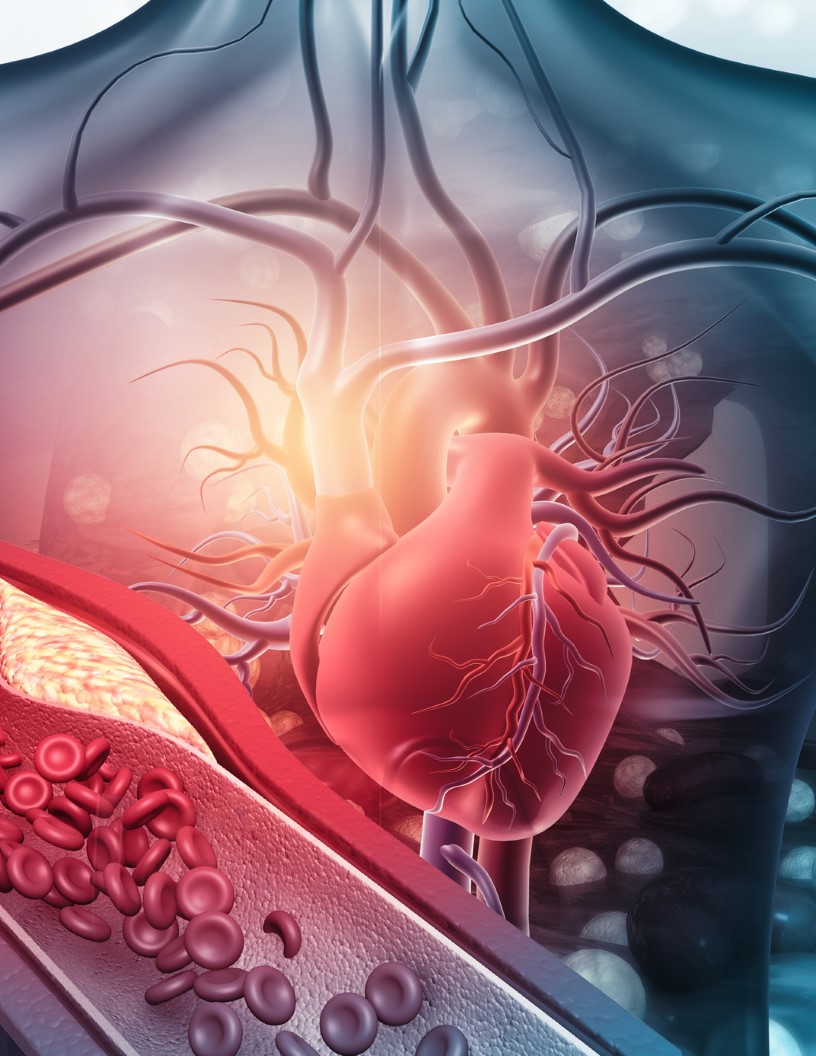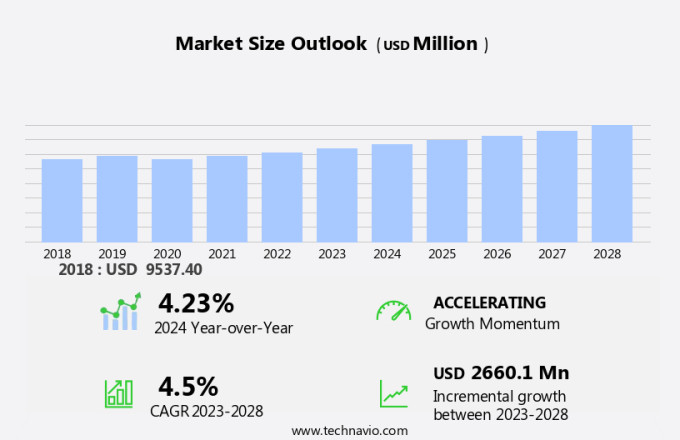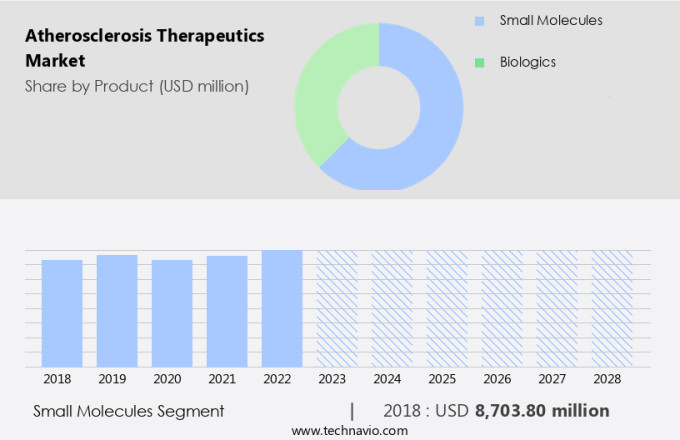Atherosclerosis Therapeutics Market Size 2024-2028
The atherosclerosis therapeutics market size is forecast to increase by USD 2.66 billion at a CAGR of 4.5% between 2023 and 2028. The market is witnessing significant growth due to the rising prevalence of cardiovascular diseases, particularly in the geriatric population and health-conscious consumers. The market is driven by the identification of new targets for atherosclerosis treatment and the development of more effective therapeutics to address the side effects associated with existing medications, such as antiplatelet medications, cholesterol-lowering medications, beta blocker medications, and ACE inhibitor medications. Clinical trials are ongoing to evaluate the efficacy and safety of new therapeutic approaches. Extremities, including the legs and arms, are increasingly becoming a focus for atherosclerosis treatment due to the high incidence of peripheral arterial disease. The market is also influenced by factors such as medical tourism and e-commerce, which offer cost-effective treatment options to consumers. Consumption of carbohydrate-based foods and sedentary lifestyles further contribute to the market growth. It is essential for market players to stay updated on these trends and challenges to remain competitive in the market.
What will be the Size of the Market During the Forecast Period?
Atherosclerosis is a chronic condition characterized by the buildup of fatty materials, cholesterol, cellular waste products, calcium, fibrin, and other substances in the inner layer of arterial walls. This process, which primarily affects the arteries supplying blood to the body's organs and extremities, can lead to various complications, including inflammation, vascular illness, and impaired blood flow. The market encompasses a range of medications designed to manage this complex disease. Antiplatelet medications, cholesterol-lowering medications, and beta blocker medications are among the primary classes of drugs used in the treatment of atherosclerosis. These medications aim to reduce the risk of blood clots, lower cholesterol levels, and control blood pressure, respectively. Atherosclerosis is a multifactorial disease, and its progression is influenced by several factors, including chronic inflammation and hemostatic imbalance. Endothelial cells, the cells lining the inner surface of blood vessels, play a crucial role in maintaining the vasomotor tone and preventing the development of atherosclerotic plaques.
However, chronic endothelial inflammation and the subsequent disruption of the endothelial barrier contribute to the initiation and progression of atherosclerosis. The ongoing SARS-CoV-2 infection pandemic has highlighted the importance of managing atherosclerosis and other vascular illnesses. The virus's ability to induce a cytokine storm, a hyperinflammatory response, exacerbates the inflammatory response in the vasculature and increases the risk of thrombotic complications. Currently, several classes of medications, including ACE inhibitor medications, are used to manage atherosclerosis and its complications. These medications help to reduce inflammation, protect the endothelium, and improve vasomotor tone.
Nevertheless, the limited efficacy and potential side effects of these medications necessitate the development of novel therapeutic strategies. The future of atherosclerosis therapeutics lies in the development of targeted therapies that address the underlying mechanisms of the disease. These include drugs that modulate the inflammatory response, target specific cellular pathways, and enhance the body's natural ability to repair and heal the damaged endothelium. In conclusion, the market represents a significant opportunity for the development of novel drugs and therapeutic strategies. The ongoing research in this area holds promise for the creation of more effective and safer treatments for this chronic and debilitating condition. As health-conscious consumers become increasingly aware of the importance of managing their cardiovascular health, the demand for effective atherosclerosis therapies is expected to grow.
Market Segmentation
The market research report provides comprehensive data (region-wise segment analysis), with forecasts and estimates in "USD million" for the period 2024-2028, as well as historical data from 2018-2022 for the following segments.
- Product
- Small molecules
- Biologics
- Geography
- North America
- Canada
- US
- Europe
- Germany
- UK
- Asia
- China
- Rest of World (ROW)
- North America
By Product Insights
The small molecules segment is estimated to witness significant growth during the forecast period. The market in the US is primarily driven by the use of small molecule drugs for treating this condition. These medications, which include cholesterol-lowering drugs like statins, ACE inhibitors, beta-blockers, and antiplatelet agents, accounted for the largest market share in 2023. Statins, in particular, are widely used for their ability to lower LDL (low-density lipoprotein) levels, reducing plaque size and inflammation, and stabilizing plaques. Other classes of drugs, such as calcium channel blockers and nitrates, also contribute to the market's growth.
Health-conscious consumers, the geriatric population, and those suffering from cardiovascular diseases are the primary consumers of these therapies. Clinical trials are ongoing to develop more effective and targeted treatments. E-commerce and medical tourism have made these medications more accessible to a wider population. The consumption of carbohydrate-based foods and sedentary lifestyles contribute to the rising prevalence of atherosclerosis, further driving market growth.
Get a glance at the market share of various segments Request Free Sample
The small molecules segment accounted for USD 8.70 billion in 2018 and showed a gradual increase during the forecast period.
Regional Insights
North America is estimated to contribute 44% to the growth of the global market during the forecast period. Technavio's analysts have elaborately explained the regional trends and drivers that shape the market during the forecast period.
For more insights on the market share of various regions Request Free Sample
In North America, the market is experiencing growth due to the significant population suffering from this vascular illness. The prevalence of atherosclerosis is high, particularly among older adults, ensuring a consistent demand for these therapeutics. Furthermore, the widespread adoption of health insurance coverage has enabled more individuals to access and purchase atherosclerosis therapeutics, thereby fueling market expansion. According to the Centers for Disease Control and Prevention (CDC), approximately 98% of older adults aged 65 and above had health insurance coverage in 2019. This population segment is disproportionately affected by atherosclerosis, as chronic endothelial inflammation and the imbalance of hemostatic balance can lead to complications such as SARS CoV2 infection, cytokine storm, and thrombotic problems.
Further, the inflammatory response and vasomotor tone dysregulation associated with atherosclerosis necessitate effective therapeutic interventions. Statin treatments are commonly used to manage atherosclerosis, but research continues to explore novel therapeutic approaches. The market for atherosclerosis therapeutics is expected to grow steadily during the forecast period, driven by the increasing need for effective treatments for this chronic condition.
Our researchers analyzed the data with 2023 as the base year, along with the key drivers, trends, and challenges. A holistic analysis of drivers will help companies refine their marketing strategies to gain a competitive advantage.
Market Driver
Increasing risk factors for atherosclerosis is the key driver of the market. Atherosclerosis is a persistent and complex disease characterized by plaque formation in the arterial walls. Several risk factors have been identified as contributing to its development and progression. Among these, sedentary lifestyle, high blood pressure, high cholesterol, and obesity are significant contributors. High alcohol consumption also plays a role in the disease process. Obesity, in particular, is linked to atherosclerosis through various mechanisms, including hypertension, diabetes, and abnormal lipoproteins. These conditions increase the risk of plaque formation, leading to artery blockages. The resulting conditions, such as ischemia, stroke, and myocardial infarction, can have severe consequences for overall health. Understanding the risk factors of atherosclerosis is crucial for prevention and early intervention.
Further, by addressing these risk factors, individuals can reduce their risk of developing the disease and its associated complications. For instance, maintaining a healthy weight, regular physical activity, controlling blood pressure, and managing cholesterol levels can all help mitigate the risk of atherosclerosis. In conclusion, atherosclerosis is a multifactorial disease, and several risk factors, including sedentary lifestyle, high blood pressure, high cholesterol, obesity, and high alcohol consumption, contribute to its development and progression. Addressing these risk factors through lifestyle modifications and medical interventions can help prevent and manage atherosclerosis and its complications.
Market Trends
Identification of new pathogenic targets is the upcoming trend in the market. Atherosclerosis, a chronic condition characterized by the buildup of plaque made up of fatty materials, cholesterol, cellular waste products, calcium, fibrin, and other substances in the arterial walls, is a complex disease with various contributing factors. One such factor is infection by Chlamydia pneumoniae (C. Pneumoniae), which has been linked to the pathogenesis of atherosclerosis. Research indicates that C. Pneumoniae infects three primary cell types: endothelial cells, macrophages, and smooth muscle cells. The resulting inflammatory response triggers the production of cytokines, including interferons (IFN) and interleukins (IL), as well as growth factors. Therefore, understanding the role of C. Pneumoniae in atherosclerosis may lead to the development of novel therapeutic strategies for this debilitating disease.
Market Challenge
Side-effects associated with atherosclerosis therapeutics is a key challenge affecting the market growth. The market caters to the treatment of this condition primarily through small molecule medications. Notable classes of these drugs include statins, which are cholesterol-lowering agents. Statins, such as ZOCOR (simvastatin), are widely used as primary treatments for atherosclerosis. These drugs work by reducing the level of low-density lipoprotein (LDL) cholesterol in the blood. Elevated LDL cholesterol is a significant risk factor for atherosclerosis, making statins crucial in preventing plaque formation. However, despite their therapeutic benefits, statins can cause side effects.
For instance, ZOCOR is an adjunct to a healthy diet and regular exercise, and it functions by lowering LDL cholesterol levels. This medication's importance lies in its ability to mitigate the risk of atherosclerosis development. Healthcare services continue to invest in infrastructure to diagnose and treat atherosclerosis and its related cardiovascular diseases (CVDs), such as ischemic heart disease. The diagnostic rates for CVDs, driven by sedentary lifestyles and energy-dense food consumption, continue to rise. As a result, the demand for effective therapeutics, including statins, remains high.
Exclusive Customer Landscape
The market forecasting report includes the adoption lifecycle of the market, covering from the innovator's stage to the laggard's stage. It focuses on adoption rates in different regions based on penetration. Furthermore, the report also includes key purchase criteria and drivers of price sensitivity to help companies evaluate and develop their market growth analysis strategies.
Customer Landscape
Key Companies & Market Insights
Companies are implementing various strategies, such as strategic alliances, partnerships, mergers and acquisitions, geographical expansion, and product/service launches, to enhance their presence in the market.
Amgen Inc. - The company offers atherosclerosis therapeutics such as Repatha (evolocumab) and optimized statin therapy.
The market research and growth report includes detailed analyses of the competitive landscape of the market and information about key companies, including:
- AstraZeneca Plc
- Dr Reddys Laboratories Ltd.
- Eli Lilly and Co.
- F. Hoffmann La Roche Ltd.
- GlaxoSmithKline Plc
- Ionis Pharmaceuticals Inc.
- Merck and Co. Inc.
- Novartis AG
- Pfizer Inc.
- Regeneron Pharmaceuticals Inc.
- Sanofi SA
- Viatris Inc.
Qualitative and quantitative analysis of companies has been conducted to help clients understand the wider business environment as well as the strengths and weaknesses of key market players. Data is qualitatively analyzed to categorize companies as pure play, category-focused, industry-focused, and diversified; it is quantitatively analyzed to categorize companies as dominant, leading, strong, tentative, and weak.
Research Analyst Overview
Atherosclerosis is a chronic condition characterized by the buildup of fatty materials, cholesterol, cellular waste products, calcium, fibrin, and other substances in the inner layer of arterial walls. This process, known as plaque formation, can lead to various cardiovascular diseases (CVDs), including ischemic heart disease, stroke, arterial thrombosis, and myocardial infarction. The prevalence of atherosclerosis is high among populations with poor eating habits, sedentary lifestyles, high blood pressure, high cholesterol, obesity, and high alcohol consumption. The therapeutic market for atherosclerosis focuses on antiplatelet medications, cholesterol-lowering medications, and beta blocker medications, among others. Antiplatelet medications prevent the formation of blood clots, while cholesterol-lowering medications reduce the amount of cholesterol in the blood. Beta blocker medications help regulate heart rate and blood pressure. Clinical trials are ongoing to develop new therapies for atherosclerosis, including vaccinations and treatments for chronic endothelial inflammation.
Further, health-conscious consumers are increasingly seeking out atherosclerosis treatments through various channels, including hospitals, pharmacies, online providers, and drug stores. The geriatric population is a significant market for atherosclerosis therapeutics due to the higher prevalence of CVDs in older adults. Medical tourism and e-commerce are also emerging trends in the delivery of atherosclerosis treatments. Lung conditions such as SARS-CoV-2 infection and vascular illness can exacerbate atherosclerosis and its complications. Atherosclerosis is a complex condition involving chronic inflammation, hemostatic imbalance, and an inflammatory response. Statin treatment and thrombotic problems are common challenges in managing atherosclerosis. The market for atherosclerosis therapeutics is expected to grow due to the increasing prevalence of CVDs and the development of new treatments. However, the high cost of branded medications and the availability of generic products are key challenges for market growth.
|
Market Scope |
|
|
Report Coverage |
Details |
|
Page number |
145 |
|
Base year |
2023 |
|
Historic period |
2018-2022 |
|
Forecast period |
2024-2028 |
|
Growth momentum & CAGR |
Accelerate at a CAGR of 4.5% |
|
Market Growth 2024-2028 |
USD 2.66 billion |
|
Market structure |
Concentrated |
|
YoY growth 2023-2024(%) |
4.23 |
|
Regional analysis |
North America, Europe, Asia, and Rest of World (ROW) |
|
Performing market contribution |
North America at 44% |
|
Key countries |
US, Canada, UK, China, and Germany |
|
Competitive landscape |
Leading Companies, Market Positioning of Companies, Competitive Strategies, and Industry Risks |
|
Key companies profiled |
Amgen Inc., AstraZeneca Plc, Dr Reddys Laboratories Ltd., Eli Lilly and Co., F. Hoffmann La Roche Ltd., GlaxoSmithKline Plc, Ionis Pharmaceuticals Inc., Merck and Co. Inc., Novartis AG, Pfizer Inc., Regeneron Pharmaceuticals Inc., Sanofi SA, and Viatris Inc. |
|
Market dynamics |
Parent market analysis, market growth inducers and obstacles, market forecast, fast-growing and slow-growing segment analysis, COVID-19 impact and recovery analysis and future consumer dynamics, market condition analysis for the forecast period |
|
Customization purview |
If our market report has not included the data that you are looking for, you can reach out to our analysts and get segments customized. |
What are the Key Data Covered in this Market Research and Growth Report?
- CAGR of the market during the forecast period
- Detailed information on factors that will drive the market growth and forecasting between 2024 and 2028
- Precise estimation of the size of the market and its contribution of the market in focus to the parent market
- Accurate predictions about upcoming market growth and trends and changes in consumer behaviour
- Growth of the market across North America, Europe, Asia, and Rest of World (ROW)
- Thorough analysis of the market's competitive landscape and detailed information about companies
- Comprehensive analysis of factors that will challenge the growth of market companies
We can help! Our analysts can customize this market research report to meet your requirements. Get in touch




